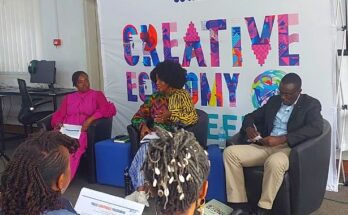Zim music producers
Music is Zimbabwe’s most popular and accessible art form, and a very significant expression of the country’s unique cultural identity.
It is not a secret that the country has some of the most talented producers on the continent, although limited opportunities seem to overshadow such.
While the lack of opportunities and support structures plays a part, let me also point out what many fear to mention; some of the producers are used to their own bubbles or comfort zones. The Zimbabwean music industry these days is like ‘mushika-shika’ where people make do with whatever they have at their disposal and they are content.
We have had a few lucky producers who end up making an impact on the global stage, but most of the time it’s for a short period.
At one time when we had the likes of Fortune Muparutsa, TBA and Take5 to name a few who benefited greatly from that local content policy which paved the way for many young producers.
We however still have a situation where our producers end up being spectators and fans of their counterparts from across the continent, the same producers they are supposed to be at par with, and I think is time to be candid and honest with each other, so that we start conversations that help the industry grow.
Zim music producers should be authentic
What I think may be lacking is some sort of originality and authentic Zimbabwean sound. We can’t always depend on borrowed Jamaican sound and try to domesticate it and still hope we will find a market that has an appetite for such music outside our borders.
As an artist, it is not enough to be praised that you sound ‘international’ while you lack originality. It’s a waste of time listening to your own circles telling you that you are ‘underrated’ when there is no one who is supposed to rate you or give you exposure on a silver platter in the first place.
Zimbabwean producers need to start partnering with talented local songwriters, who can help generate potential hits for artists.
It doesn’t always mean an artist has to write their songs, there is nothing to prove. Because you can sing doesn’t mean you are a good writer and vice versa.
A proven formula worldwide is that of a team of songwriters being involved in a project. If global stars need that, what stops upcoming artists from doing that?
Harare based producers, artists and studios tend to get a lot of exposure due to their proximity to opportunities, including sponsors, radio stations, TV, events, promoters and venues.
This system has been in existence since forever, and it would be one’s hope that the same Harare produces composers and songwriters create music that can conquer the continent. But that’s still a dream, it has not worked. It is time to change that.
Where are the producers from Bindura, Mutare, Kwekwe, Chinhoyi, Masvingo, Chipinge or Marondera? When are they going to be afforded a chance to shine?
There is also a need for collaboration. 2021 is a year to start seeking collaborations. Zim producers don’t need to start working with popular artists and producers only. Find other upcoming producers and artists in other markets across Africa.
Use social media to create networks, be humble and professional, it will pay off later. Have self-confidence, seek out working partnerships, in most cases it costs nothing. Use that opportunity to build a body of work to use on your other pitches for collaborations, conquer Senegal, Cameroon or Uganda. Be heard in Mozambique, Ethiopia or Liberia.
We must all agree that the Zim music industry is in dire need of institutional and financial support for its survival.
The industry can survive if we make it viable and sustainable. Hoping that the government will do something to save the industry from the fiscus is nothing short of daydreaming.
Depending on NGOs to prop up the industry may work in the short term, but in the long term we need a self-sustaining industry which can attract corporate buy in. It is encouraging that we have companies like NashTV creating platforms for young people to showcase their talents, although that’s still a far cry from what’s needed.
Considering the cancellation of public gatherings in the country, music practitioners, most of whom rely heavily on live performances to make a living, have been hit particularly hard as most income generating channels are completely closed. Producers can use the time to create new material as well as reworking growth strategies going forward.
As much as consumption of cultural content such as music, films, literature and performances through television, smartphones and radio have all increased dramatically, how much content from Zimbabwe is being consumed in South Africa, East Africa or West Africa?
It is encouraging that early this year, the National Arts Council of Zimbabwe (NACZ) and UNESCO kicked off the implementation of a project funded by the European Union aimed at supporting Zimbabwe in developing a national strategy to reinforce its music industry.
The pilot project is envisaged to serve as a template for the development of other industries in the future, notably film and visual arts which form part of the music industry value chain.
I support the idea of de-structuring of the music value chain and confronting all sorts of exploitation, including but not limited to piracy, which remains one of the biggest obstacles making the industry less competitive. Let us not forget that we don’t have proper distribution channels, let’s innovate.
As much as Zimbabwe has raw talent, with no major record labels and lack of investment in the sector, many producers and artists are forced to compete for the few available opportunities and slots. We want our producers and artists to gun for airplay on all top radio stations in Nigeria, Kenya, Angola, Ghana, South Africa and Tanzania.
We want more Zimbabwean Music videos on BET, Trace Urban, MTV etc. We want African artists to start seeking collaborations with Zimbabwean artists. All that can only happen if we have our own authentic and unique sound and producers prepared to go get what’s theirs.
What we need going forward is structures that help nurture, promote and distribute musical talents, proper A&R structures who help grow our artists and producer profiles, with an outward looking agenda, a departure from the instant gratification trend which makes our producers and artists settle for street fame, a few Zim diaspora gigs and an ability survive on a day to day basis. We need a piece of the African music industry cake, and our producers must start working towards that.
Tendai Joe is a South Africa based independent A&R Manager, Business Developer and Digital consultant, with interests in music, AI, film, Digital Marketing and software development. He has worked on creative projects with major labels including EMI, Sony/ATV Publishing SA and Sony Music Africa, to mention a few. @Tendaijoe on Twitter.




